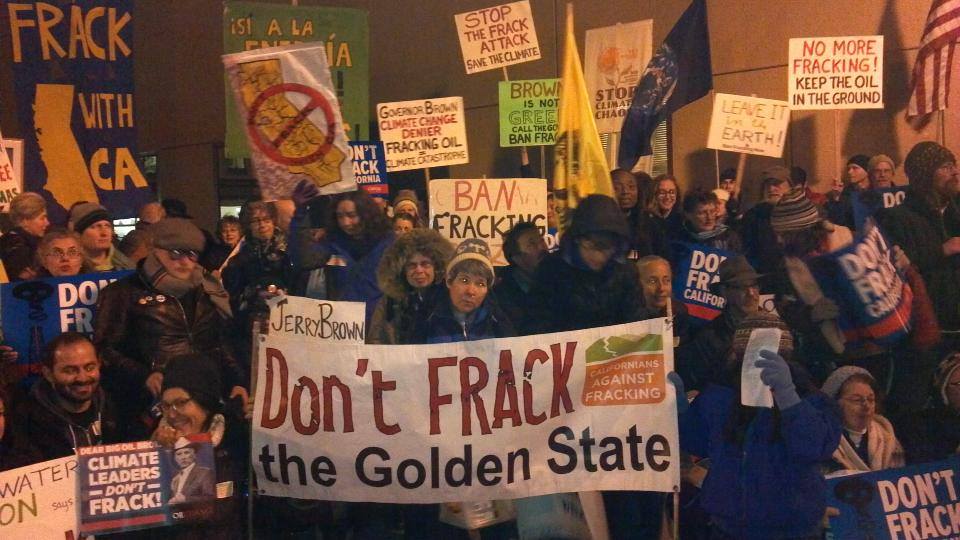Last night, dozens of concerned Californians descended on the Oakland convention center for a “scoping meeting” regarding the California Division of Oil, Gas, and Geothermal Resources “environmental impact report” process that is kicking off to study the impacts of fracking in the state.
By my count, every comment that was delivered expressed concern over fracking the state, with a vast majority calling for an outright moratorium or ban. It was a heartening show of strength for the fast-growing anti-fracking movement in California.
And what’s more, about 100 or so protestors gathered outside of the hearing.
I was one of many to delivery testimony in support of a stop to fracking in California at the hearing…here’s what I said:
My name is David Turnbull, I live in San Francisco, and I work for Oil Change International, a non-profit organization focused on highlighting the true costs of fossil fuels and facilitating the transition towards a clean energy future.
Through this and other processes, you will undoubtedly hear from an overwhelming number of Californians expressing serious and justified concerns about the many local impacts fracking will be responsible for in their communities. Fracking threatens our precious water resources, the air we breathe, and our communities in countless ways.
It is vital for the Environmental Impact Report to fully account for these local impacts, which on their own should be reason enough to disallow fracking in our state.
But additionally, fracking in California must be considered in a broader context.
Our state, our country and our global community is facing a climate crisis. Every day we are seeing the impacts of a warming climate, be they super typhoons across the world, or earlier and prolonged fire seasons here at home. Looking to the east, we see a drying Sierra and dwindling water supplies and to our west we see rising seas threatening our communities.
Climate change is here. Now.
In numerous recent studies, scientists, energy analysts, and financial analysts have all concluded that we as a global community already possess far more fossil fuels in proven reserves than our climate system can withstand being burned. We simply cannot burn it all.
In fact, recent analysis from the Intergovernmental Panel on Climate Change as well as the International Energy Agency suggests that we must leave the vast majority of proven fossil fuels in the ground in order to avoid catastrophic climate change.
Meanwhile, we are here to speak about analyzing the impacts of an extreme process that intends to allow oil and gas companies to find and extract new sources of both natural gas AND OIL in California. The oil resting in the Monterey and other parts of our state exists outside of the proven reserves discussed by the IPCC and IEA. In other words, we cannot even begin to consider extracting this oil and burning it if we are to be serious about tackling the climate challenge.
It is vital that serious consideration of new fossil fuel extraction processes by the State of California fully take the climate crisis and our global carbon budget into account. Our state has been a leader in a fog of climate inaction in years past. Allowing our state to be fracked goes against everything we’ve worked towards.
When you’re in a hole it’s time to stop digging. We are in a massive climate hole, and the last thing we should do is consider new ways to dig deeper.

